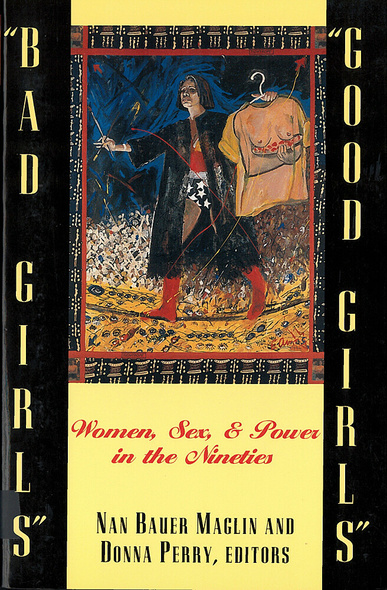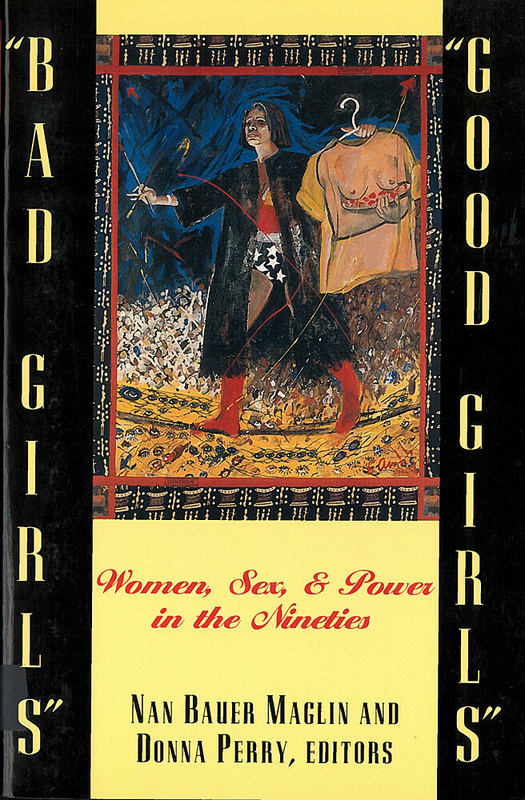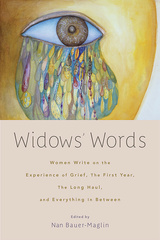"Bad Girls"/"Good Girls"
Women, Sex, and Power in the Nineties
Edited by Nan Bauer-Maglin and Donna Perry
Rutgers University Press
Agents or victims, liberated or oppressed, "bad girls" or "good girls." What do these labels mean and do they further or hinder women's progress? How are today's visions of female sexuality and power like or unlike those of the past? How do younger women define feminism? Isn't the personal still political?
Dismayed by the media's tendency to reduce the feminist enterprise to labels and superstars, Donna Perry and Nan Bauer Maglin decided to find out what a diverse group of feminists think about women, sex, and power in the nineties. The result is a provocative and varied collection of twenty-four essays by second- and third-wave feminists; artists and activists; professors and graduate students; professional journalists and just-published writers; mothers and daughters. By focusing on society's construction, containment, and exploitation of female sexuality, in particular, these essays offer fresh perspectives on women's agency or lack of it.
The contributors focus on the oversimplifications and false dichotomies in current discussions of female sexuality, as well as the privileged perspective and individualism that currently dominate the popularized feminist message. Individual writers—including Emma Amos, bell hooks, Ann Jones, Lisa Jones, Paula Kamen, Matuschka, Marge Piercy, Katha Pollitt, Anna Quindlen, Elayne Rapping, Lillian S. Robinson, and Ellen Willis—reexamine women's empowerment in the light of issues like AIDS, battering, acquaintance rape, narratives of childhood sexual abuse, and pornography. Several draw political conclusions from their personal struggles, while others read stories and texts—from history, the art world, the media, popular culture, and social science research—in new and controversial ways.
Dismayed by the media's tendency to reduce the feminist enterprise to labels and superstars, Donna Perry and Nan Bauer Maglin decided to find out what a diverse group of feminists think about women, sex, and power in the nineties. The result is a provocative and varied collection of twenty-four essays by second- and third-wave feminists; artists and activists; professors and graduate students; professional journalists and just-published writers; mothers and daughters. By focusing on society's construction, containment, and exploitation of female sexuality, in particular, these essays offer fresh perspectives on women's agency or lack of it.
The contributors focus on the oversimplifications and false dichotomies in current discussions of female sexuality, as well as the privileged perspective and individualism that currently dominate the popularized feminist message. Individual writers—including Emma Amos, bell hooks, Ann Jones, Lisa Jones, Paula Kamen, Matuschka, Marge Piercy, Katha Pollitt, Anna Quindlen, Elayne Rapping, Lillian S. Robinson, and Ellen Willis—reexamine women's empowerment in the light of issues like AIDS, battering, acquaintance rape, narratives of childhood sexual abuse, and pornography. Several draw political conclusions from their personal struggles, while others read stories and texts—from history, the art world, the media, popular culture, and social science research—in new and controversial ways.
The editors call this book a political action; it is also a great read. Its widely varied and reflective contributions combat oversimplifications and false oppositions in discussions of female sexuality in ways that engage our hearts as well as our intellects.
NAN BAUER MAGLIN, a professor of English at Borough of Manhattan Community College, the City University of New York, coedited Women and Stepfamilies: Voices of Anger and Love.
DONNA PERRY, author of Backtalk: Women Writers Speak Out (Rutgers University Press), is a professor of English at William Paterson College.
DONNA PERRY, author of Backtalk: Women Writers Speak Out (Rutgers University Press), is a professor of English at William Paterson College.
"One bird, if there is only one, dies in the night" / Marge Piercy
And now, babe feminism / Anna Quindlen
What did you do in the gender wars? / Katha Pollitt
Confessions of two good girls / Jan Wilkotz and Miranda Wilkotz
Adjusting to oppression : the rise of therapeutic feminism in the United States / Jillian Sandell
The personal is still political : the legacy of 1970s feminism / Jane Gerhard
Villains and victims : "sexual correctness" and the repression of feminism / Ellen Willis
Dissident heat : fire with fire / bell hooks
Lorena's army / Katha Pollitt
"Victim feminism" and the complexities of AIDS / Katie J. Hogan
Coming out as an alien : feminists, UFOs, and the "Oprah effect" / Jodi Dean
We are all "good woman!" : a womanist critique of the current feminist conflict / Barbara McCaskill and Layli Phillips
Silver / Deborah A. Miranda
Victim and Valkyrie / Anna Quindlen
Acquaintance rape : revolution and reaction / Paula Kamen
Truth, community, and the politics of memory : narratives of child sexual abuse / Helen Daniels
Battering : who's going to stop it? / Ann Jones
Subject/position / Lillian S. Robinson
Porn power : sex, violence, and the meaning of images in 1980s feminism / Kegan Doyle and Dany Lacombe
How being a good girl can be bad for girls / Deborah L. Tolman and Tracy E. Higgins
Public face, private space : Asian Indian women and sexuality / Shamita Das Dasgupta and Sayantani DasGupta
Barbie gets breast cancer / Matuschka
None of my best friends : the media's unfortunate "victim/power" debate / Elayne Rapping
The invisible ones / Lisa Jones
"Changing the subject" / Emma Amos
And now, babe feminism / Anna Quindlen
What did you do in the gender wars? / Katha Pollitt
Confessions of two good girls / Jan Wilkotz and Miranda Wilkotz
Adjusting to oppression : the rise of therapeutic feminism in the United States / Jillian Sandell
The personal is still political : the legacy of 1970s feminism / Jane Gerhard
Villains and victims : "sexual correctness" and the repression of feminism / Ellen Willis
Dissident heat : fire with fire / bell hooks
Lorena's army / Katha Pollitt
"Victim feminism" and the complexities of AIDS / Katie J. Hogan
Coming out as an alien : feminists, UFOs, and the "Oprah effect" / Jodi Dean
We are all "good woman!" : a womanist critique of the current feminist conflict / Barbara McCaskill and Layli Phillips
Silver / Deborah A. Miranda
Victim and Valkyrie / Anna Quindlen
Acquaintance rape : revolution and reaction / Paula Kamen
Truth, community, and the politics of memory : narratives of child sexual abuse / Helen Daniels
Battering : who's going to stop it? / Ann Jones
Subject/position / Lillian S. Robinson
Porn power : sex, violence, and the meaning of images in 1980s feminism / Kegan Doyle and Dany Lacombe
How being a good girl can be bad for girls / Deborah L. Tolman and Tracy E. Higgins
Public face, private space : Asian Indian women and sexuality / Shamita Das Dasgupta and Sayantani DasGupta
Barbie gets breast cancer / Matuschka
None of my best friends : the media's unfortunate "victim/power" debate / Elayne Rapping
The invisible ones / Lisa Jones
"Changing the subject" / Emma Amos






